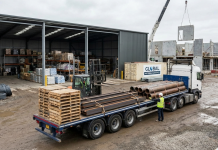Most firms think growth means more projects. I learned it means better systems.
I’ve managed the transformation from six people handling a handful of projects to an operation running over 150 jobs across Texas and beyond. What separates firms that scale from those that collapse? Architecture.
Not building architecture. Operations.
The numbers tell a brutal story. Research shows that 30% of construction work involves rework, leading to a 300% loss in crew productivity. When you’re managing five projects, you can personally catch these issues. At 150, you can’t.
Most construction firms approach scaling like this: win more bids, hire more people, hope quality holds. It doesn’t hold.
Quality erodes because the systems that worked at small scale fail at scale. The project manager who kept everything in his head can’t replicate that approach across 30 simultaneous sites. The superintendent who knew every trade partner personally can’t maintain those relationships when the roster multiplies by ten.
I built Gordon Highlander’s scaling approach on three things: repeatable systems, trusted relationships, and quality standards you don’t compromise.
Systems require the hardest shift. We implemented a project management platform that connects everything. Every milestone, quality checkpoint, and budget variance runs through one system. This creates accountability personal oversight can’t match.
The data backs this. Studies show that each additional technology adopted correlates with a 1.14% increase in expected revenue. For a firm generating $100 million, that’s $1.14 million per technology implemented.
Construction leaders report that unified data environments save 10.5 hours per week. That’s time moved from firefighting to planning.
The second part is relationships. Technology doesn’t replace relationships. It helps them scale. When your systems handle routine tracking and reporting, your people can focus on the judgment calls and relationship management that need human expertise.
The third is quality. We standardized critical processes to lock in baseline excellence across every project. Checklists, quality checkpoints, and verification steps create floors, not ceilings. They prevent failures that kill reputations while giving teams room to excel.
Scaling without systems is chaos at higher volume. I’ve seen firms double their project load and halve their profit margins because they treated growth as a sales problem instead of an operations problem.
The firms that scale successfully make a different choice. They invest in people and processes before they need them. They build systems that let excellence replicate across hundreds of projects.
Growth will test every weakness in your operation. The question is whether your systems can handle it.








